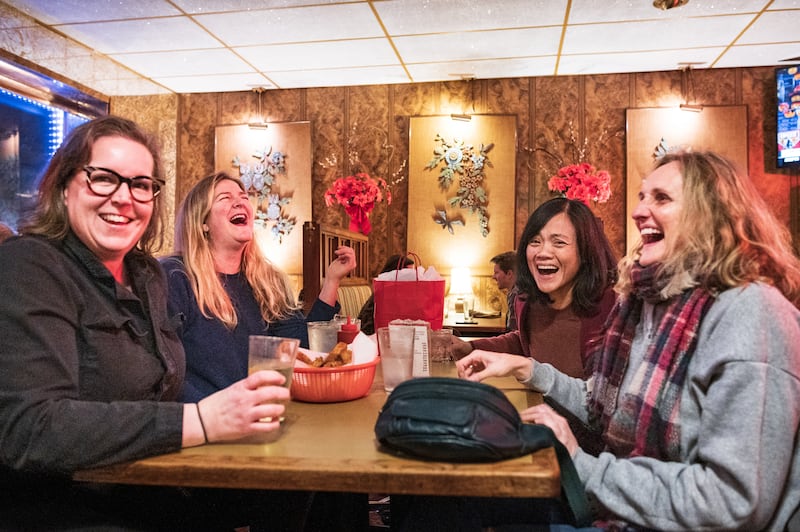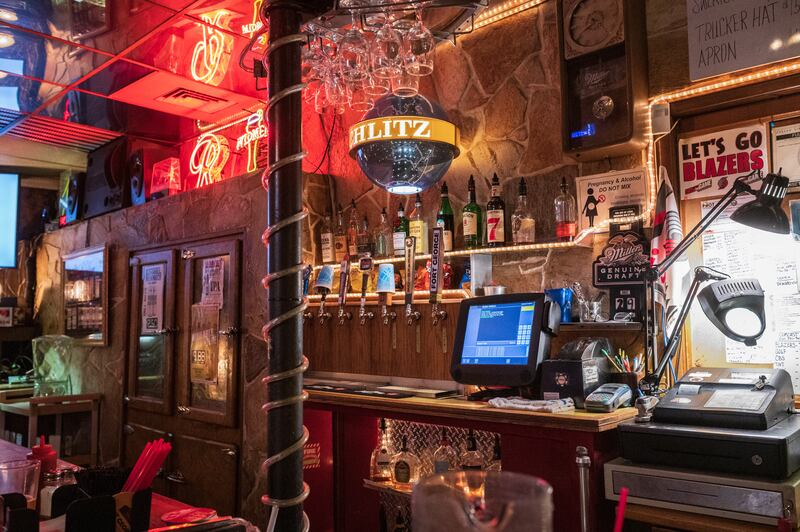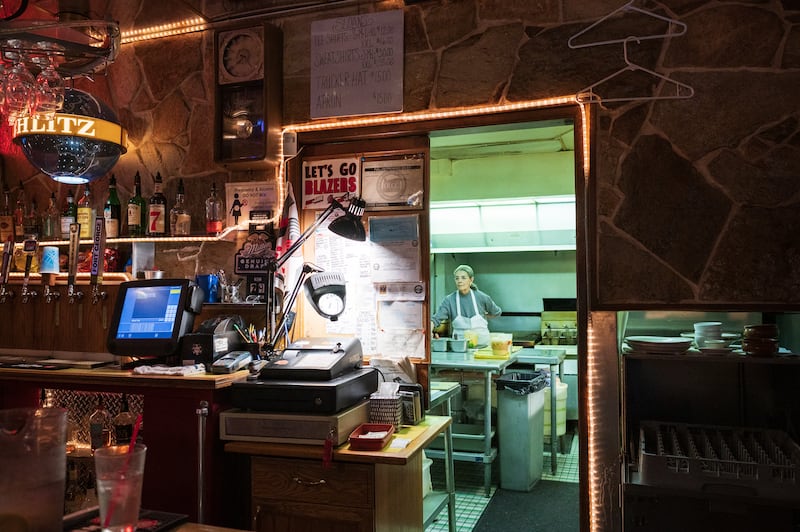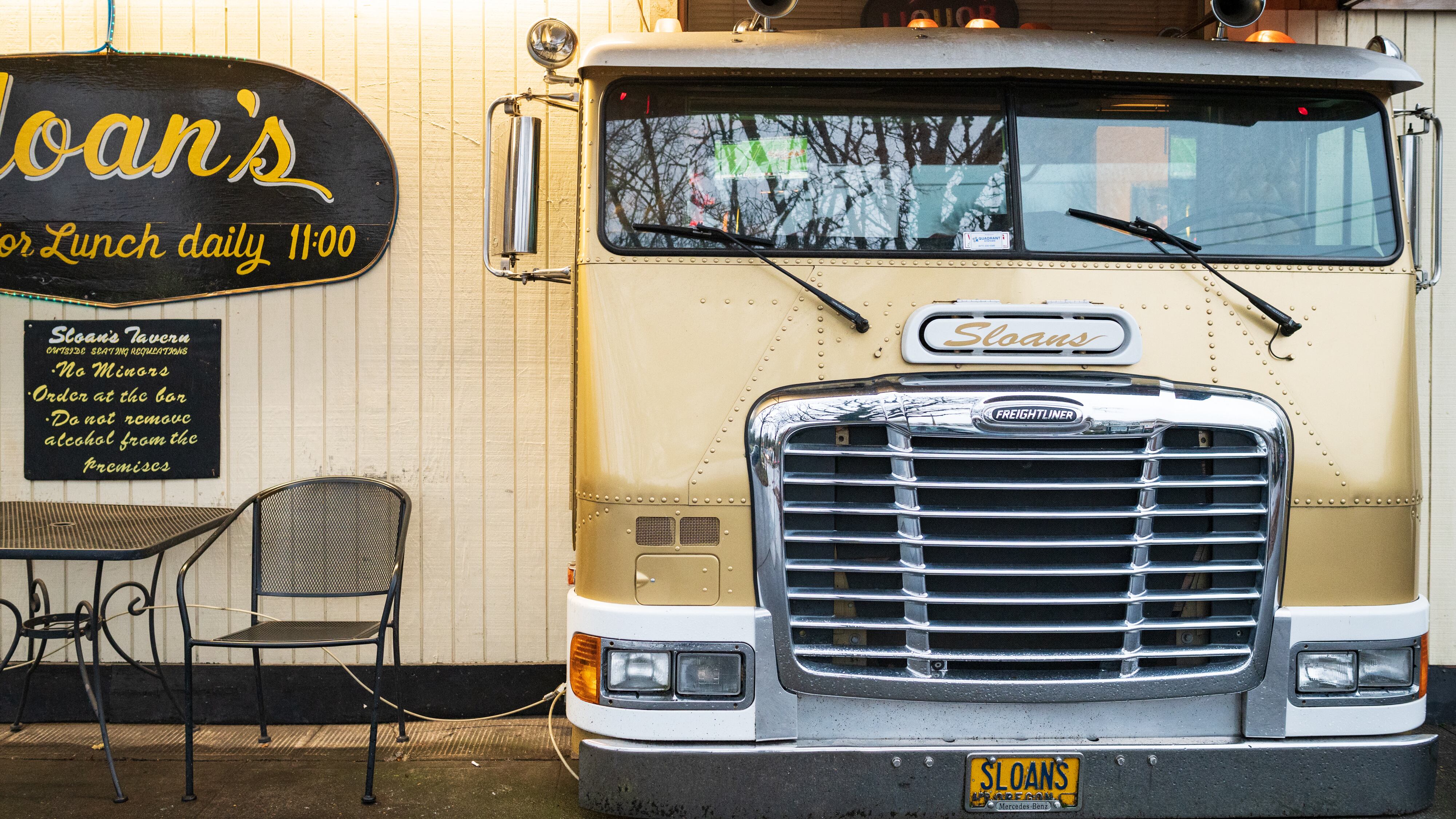Although the best-known feature of Sloan’s Tavern is the semi truck cab jutting out of the front exterior wall, it’s easy enough for even veteran patrons to remember that the beloved watering hole only ever came about as an afterthought.
“We’ve had the tavern 43 years,” recalls Shirley Sloan, “but we’d owned the body shop building since ‘58. This is definitely Old Portland.”
And somehow, the lounge seemed far older still. Both businesses closed for good Dec. 30 following Sloan’s sale of the property to developers—they plan to build a seven-story apartment building on the land, and Sloan will settle into a well-earned retirement. Nostalgic well-wishers spent the last few weeks of 2022 coming by for one last visit and often to learn just how little they really knew about the establishment.
When Bob Sloan opened the family’s eponymous auto garage on the bones of a 1926 creamery, a wholly separate dive called the Gay Paree operated from a tiny cabin near the street that the Sloans would eventually take over—extending the former cabin to nearly double its original size and decorating the interior with a particularly swank flourish of middle-American chintz that has been immaculately maintained over the decades. In the words of aught-era bartender Reg, the lounge holds “this diner feel that’s also kind of Old Vegas. It’s so beautiful inside that people go there as a destination.”

Sloan’s sense of time-swept dislocation has much to do with the décor, but its changing surroundings contribute as well. The bleak devastation wrought when the area was cleared out to make way for highway onramps and Legacy Emanuel Medical Center and its vast parking lots, Sloan’s was left utterly unmoored for a time but somehow never lost its following.
Near the entrance, between the pool table and a flat-screen TV, stood the barroom’s signal attraction: an impeccably maintained 1950s Chicago Coin’s Band Box. Tavern jukeboxes that still spin vinyl are scarce enough these days, but Sloan’s rare model added a floor show as well. Inside a glass-enclosed bandstand elevated above the machine, a small swing orchestra came to life alongside the largely vintage tunes—drummer drumming, horn section swaying—with each mini big band member moving independently in a marvel of pre-digital animatronic wizardry.
“Drop your coins, choose a 33 or a 45, the curtain opens, and then the band starts playing,” describes longtime Sloan’s booster (and X-Ray Cafe and Voodoo Doughnut co-founder) Tres Shannon. “There are only like five of these left in the world! Somebody at the bar said the last one of these to sell went for 15 grand, and that was without the band stage and figurines.”
Increasingly dependent upon Emanuel lunch crowds, Sloan’s adhered until very recently to what most would consider an unusual schedule for a bar: closed by 10 pm each weeknight and dark throughout the weekends. But the hard-earned blending of divergent customers was likely the bar’s highest achievement and what will be most mourned. Yvette, an occasional daytime patron for the past 20 years, doesn’t even drink but still dropped by “for the video poker and the good company,” she says. “It’s a nice mixture. I’m in my 60s, but some of the people are younger. Mother Shirley and Laurie, the daughter who takes the orders, are really good people. It’s a comfortable setting and really…quaint.”

Past employee Reg heartily agreed: “A lot of people came because they just appreciated the kind of bars that don’t really exist anywhere else anymore. There’s the neighborhood people who’d also visit. You’d get lots of Black folk who’ve lived around there forever. It was an awesome Blazer bar with really big crowds. People would park, come have drinks beforehand, walk down to the game, and then come back afterwards. Some people just wanted to play video poker. It was kind of the perfect neighborhood bar—a real mixed bag.”
To that end, Reg helped bring in an altogether new cross section of insta-regulars. Near the turn of the millennium, following the closure of the sorely missed Egyptian Room, Portland’s subsequent dearth of lesbian nightspots found Sloan’s filling that role quite by accident.
“This was way before Escape and Crush,” Reg says, “and it was never the focus. We weren’t trying to be the lesbian bar or anything, Sloan’s was owned by an 88-year-old woman and her husband as very much a family-run business that just happened to take the spot of the Egyptian as a sort of queer mecca.”
Just over a decade ago, the Sloans’ grandchild had just returned to Portland and began promoting a series of gay- and lesbian-themed attractions at his family’s tavern. “We were all young queers going to karaoke nights,” says Reg. “Then, 11 years ago, I got a job at the bar, and two or three others started working there. We were a handful of young queer friends who threw events all the time, so we brought in our own crowd. There was Goth Bingo. There were RuPaul drag shows. Queer this. Queer that. Oh, God, there were so many DJ nights…”

As it so happens, Google’s capsule describes Sloan’s as a “no-frills gay bar,” which misleads on several levels. “I think the algorithms still lead that direction because we used to host all of these different events there years ago, but we’re all older now with kids,” says Reg. “We don’t have that kind of time or energy, so it all just sort of faded away.”
Sloan’s, though, did very much remain a family business until the very end. Shirley tended the books each morning, and her children worked there.
“These mom-and-pop places are pretty special, you know?” Reg marvels. “The Sloans were married for a million years, and all their kids became part of the business. Laurie, the daughter, is still daytime bartender. Gene, the son, still runs the body shop in the back.”
“Someone really missed an opportunity not making a documentary about this family,” Reg adds. “They were just wildly creative people. Take a look at all the cool stuff going on in that body shop and behind that bar. What these people created was just phenomenal.”
